To effectively troubleshoot and address squeaking brakes, it is crucial to understand the underlying causes. Excessive rust or wear on brake components can contribute to noisy brakes, causing them to squeak.
Calliper issues, such as sticking or misalignment, can also be a culprit behind the irritating sound. Additionally, worn-out brake pads produce a high-pitched squealing noise when in use. Another common cause of squeaky brakes is vibration and friction between the brake rotor and pads.
These factors can result in the brakes emitting a persistent squeak while braking. Here, we will provide guidelines for using spray for squeaking brakes. So, if you’re tired of listening to that annoying sound every time you hit the brakes, read on to find out how to fix it with just a few sprays.
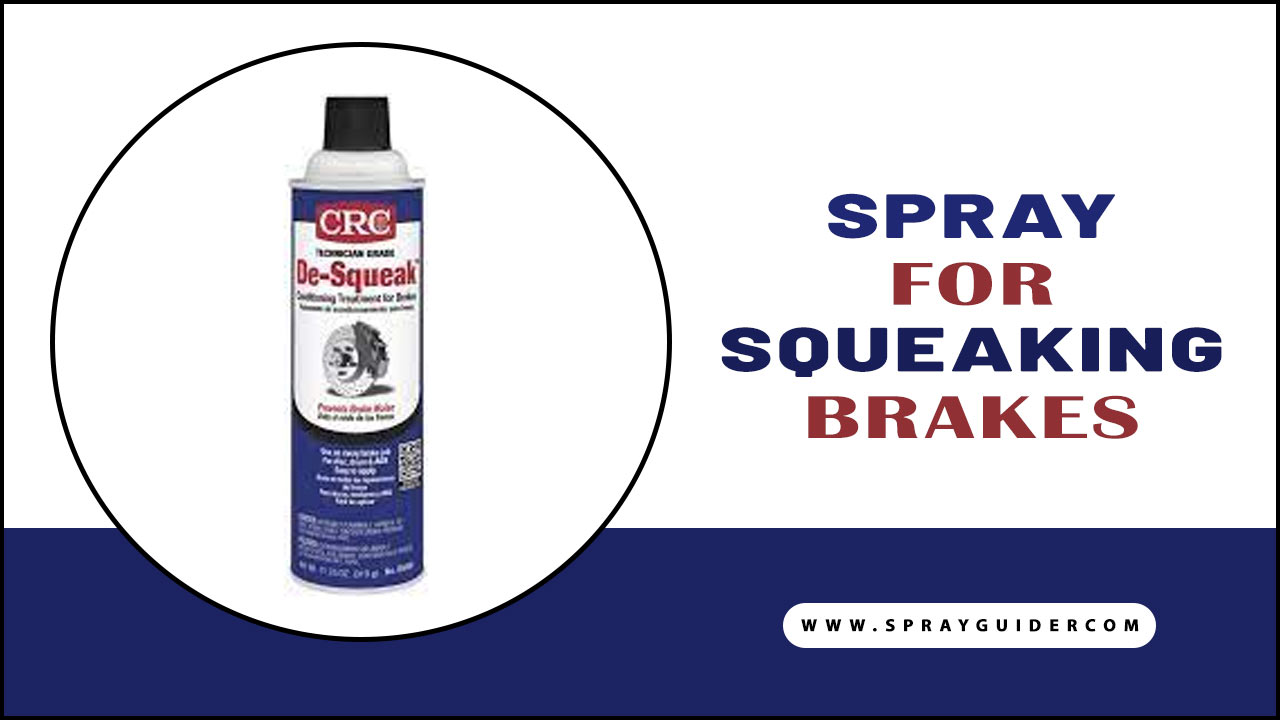
Guidelines For Using Spray For Squeaking Brakes
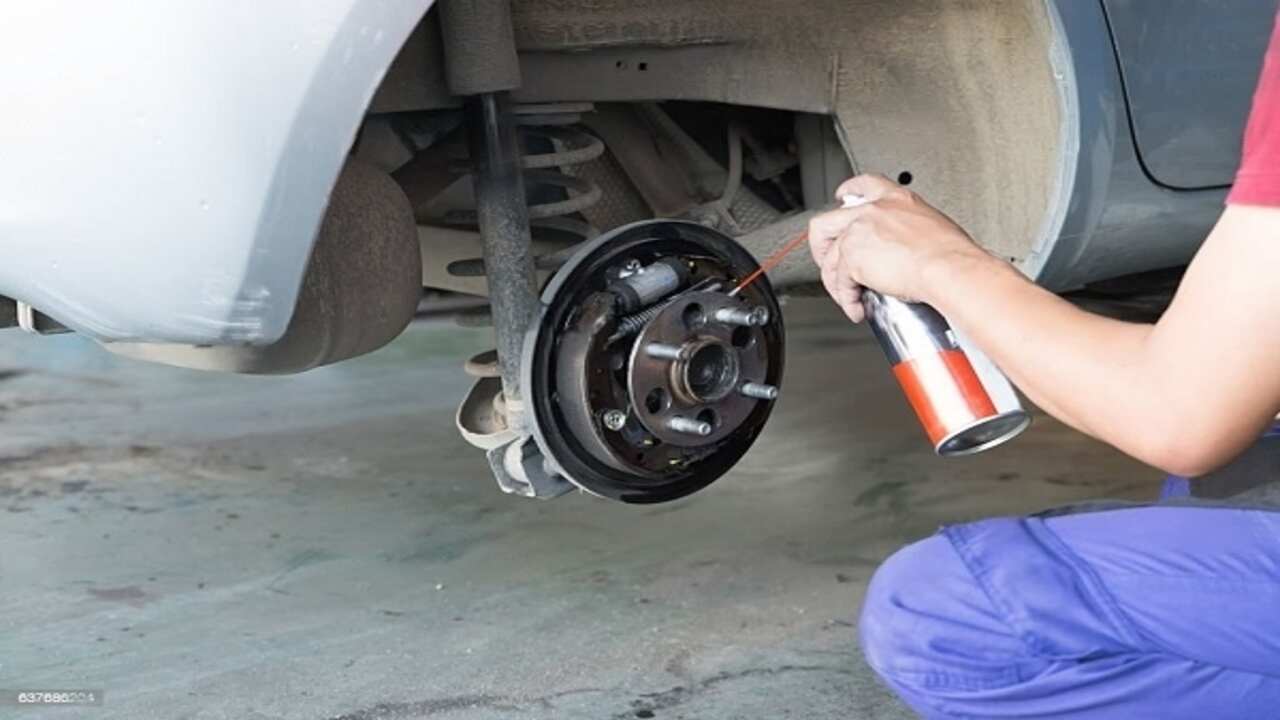
When dealing with squeaking brakes, using a spray for squeaking brakes can be an effective solution. Here are some guidelines to follow when spraying for screeching brake pads. Following these guidelines, you can effectively use a spray for squeaking bike brakes and enjoy a quieter and smoother cycling experience.
- Choose The Right Spray: Various sprays have specific designs explicitly to address squeaky brakes. Look for a high-quality brake lubricant or anti-squeal spray compatible with your vehicle’s braking system.
- Prepare The Area: Clean the brake components thoroughly before applying the spray. Remove any dirt, dust, or debris from the brake pads and rotors using a brake cleaner or soapy water.
- Apply The Spray: Shake the spray can well to ensure proper mixing of the ingredients. Spray a thin and even product layer onto the backside of the brake pads and any other metal-to-metal contact points, such as calliper pins or shims.
- Allow Time For Drying: Let the spray dry completely before reassembling the brakes. This usually takes 10-15 minutes but may vary depending on the product. Avoid touching the sprayed areas during this time.
- Test And Monitor: After reassembling, take your vehicle for a test drive to check if the squeaking has been reduced or eliminated. Keep an eye on your brakes over time to ensure they continue functioning correctly and remain quiet.
Remember, while the spray can help alleviate squeaky brakes temporarily, addressing any underlying issues causing the noise is essential. If you notice persistent or worsening noise, vibrations, or other abnormal brake behaviour, it is recommended to have your vehicle inspected by a qualified mechanic.
Why You Should Use Spray For Squeaking Bick Brake
Squeaking brakes can indicate potential wear or damage to brake components, and it’s essential to address this issue promptly. One effective solution is using spray for -squeaking brakes. Brake spray can help reduce or even eliminate brake squeaking by lubricating the moving parts.
Not only does this enhance your driving experience by minimizing annoying noises, but it also extends the lifespan of your brake components and improves overall braking performance.
Incorporating regular brake maintenance, including brake spray, into your routine can prevent more severe brake problems in the future and save you from costly repairs. So, don’t ignore those squeaks – reach for the brake spray and keep your brakes in top condition.
Pros And Cons Of Using Brake Spray
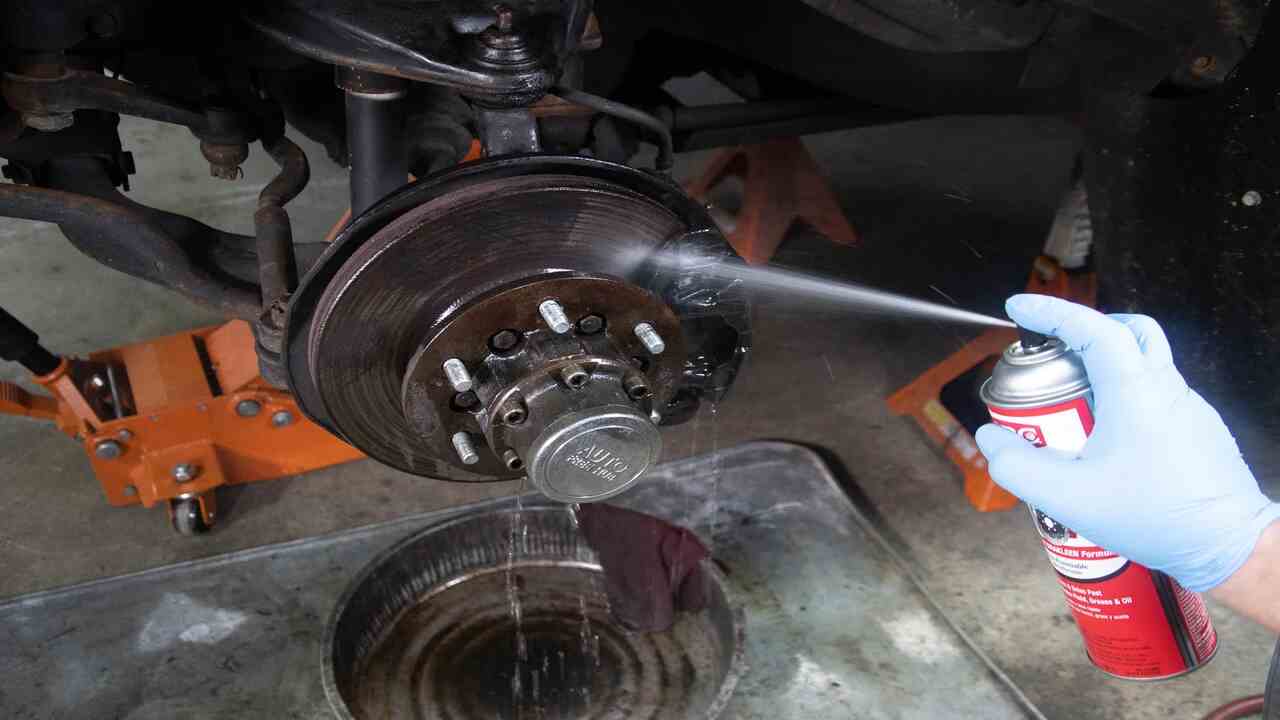
Using a brake spray can be a convenient solution for addressing squeaking brakes. Here are some pros and cons to consider when using brake spray. Using brake spray can provide a quick fix for squeaking brakes but should not be considered a long-term solution. If you are experiencing persistent or severe braking issues, it is recommended to consult with a professional mechanic for proper diagnosis and repair.
Pros:
- Quick And Easy Application: Brake spray has specific designs to be applied directly to the brake components, making it a simple and efficient solution.
- Reduces Noise: Brake spray can help to reduce or eliminate the squeaking noise caused by brake components rubbing against each other.
- Improves Braking Performance: By reducing friction and eliminating squeaks, brake spray can help improve your brakes’ overall performance.
Cons:
- Temporary Fix: Brake spray is typically a temporary solution and may need to be reapplied periodically to maintain effectiveness.
- Can Mask Underlying Issues: While brake spray can address squeaking, it may not address the root cause of the problem. Having any potential brake issues diagnosed and repaired by a professional is essential.
- Potential For Overspray: When applying brake spray, there is a risk of over spraying onto other vehicle parts. It’s essential to take precautions and protect surrounding areas during application.
Importance Of Regular Maintenance To Prevent Squeaking Brakes
Regular maintenance is crucial in preventing squeaking brakes and ensuring optimal performance. Routine inspections can identify and address potential brake issues before they escalate into major problems. Additionally, keeping brake components clean and adequately lubricated can significantly reduce the occurrence of brake squeaks.
Regular maintenance also allows for the timely replacement of worn-out brake pads or other parts, minimizing the risk of squeaking brakes. Moreover, adequately adjusted brakes reduce squeaks and enhance overall braking performance.
Furthermore, regular maintenance promotes safe driving by ensuring the reliability and longevity of the entire braking system. By investing in routine maintenance, you not only prevent the inconvenience of squeaking brakes but also extend the lifespan of your brakes, ultimately saving on costly repairs in the long run.
How Can A Spray Help In Reducing The Squeaking Noise?
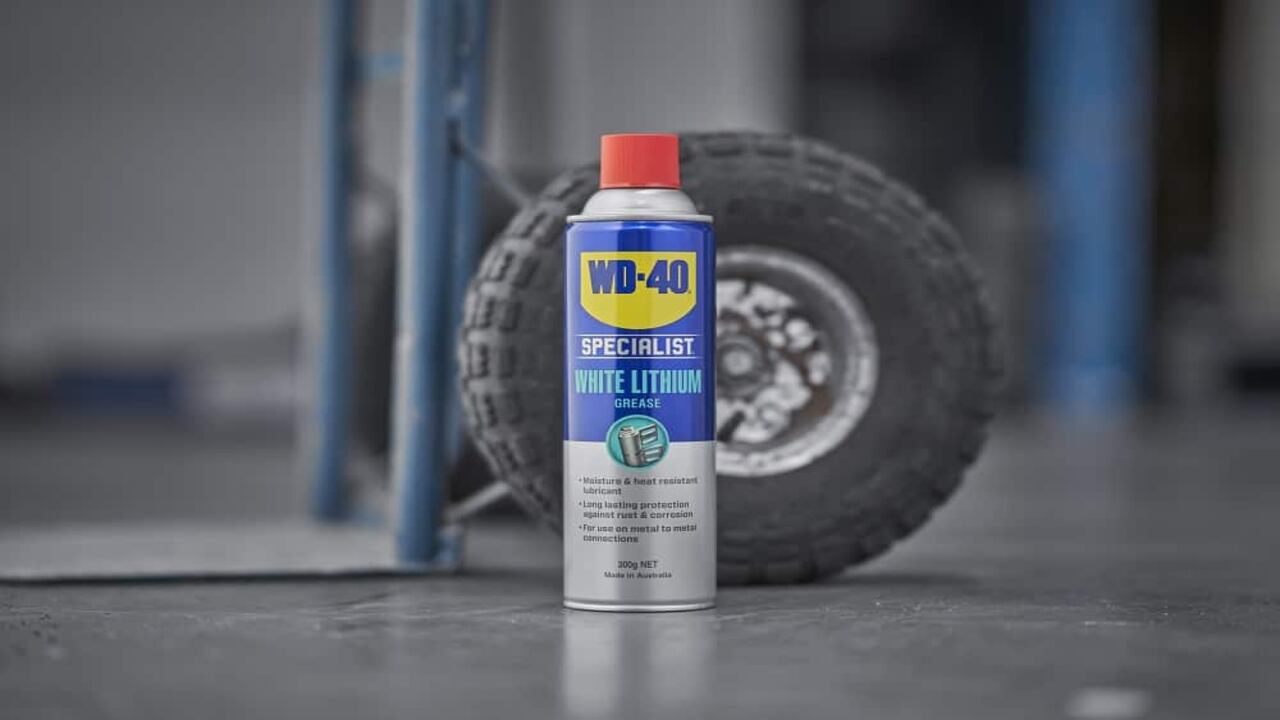
Squeaking brakes can be a significant annoyance for drivers, but there is a simple solution that can effectively reduce the noise. Using a spray designed explicitly for squeaking brakes can minimize friction and vibrations, resulting in a quieter ride.
The lubricating properties of the spray create a barrier on the brake pads, which helps to dampen noise during braking. Moreover, the spray can penetrate hard-to-reach areas, addressing the root cause of squeaking and providing long-term relief from this irritating issue.
Whether driving in stop-and-go traffic or cruising down the highway, using a brake spray can make your journey much more enjoyable by eliminating unwanted noises and improving safety on the road.
Types Of Brake Spray
Various brake sprays are available that can help address squeaking brakes. Silicone-based brake sprays provide lubrication, reducing squealing noises. Ceramic-infused brake sprays offer enhanced heat dissipation and lower noise levels. There are several types of brake spray available that can help alleviate squeaking brakes. These include:
- Silicone-Based Spray: This spray has specific designs to lubricate the brake components and reduce friction, which can help eliminate squeaking noises. A silicone-based spray formulated explicitly for brakes is essential, as other lubricants may damage the brake system.
- Anti-Squeal Spray: This spray specifically addresses brake noise issues. It contains additives that can help reduce vibrations and eliminate squeaks.
- Copper Grease: While not technically a spray, copper grease can be applied to the back of brake pads to reduce noise caused by vibrations. It acts as a cushion between the place and the calliper, helping to dampen any noise.
Before using any brake spray or lubricant, it is essential to consult your vehicle’s owner’s manual or seek guidance from a professional mechanic. Improper application or use of the wrong product can compromise your brakes’ safety and performance.
Which Brake Spray Is Best For You?
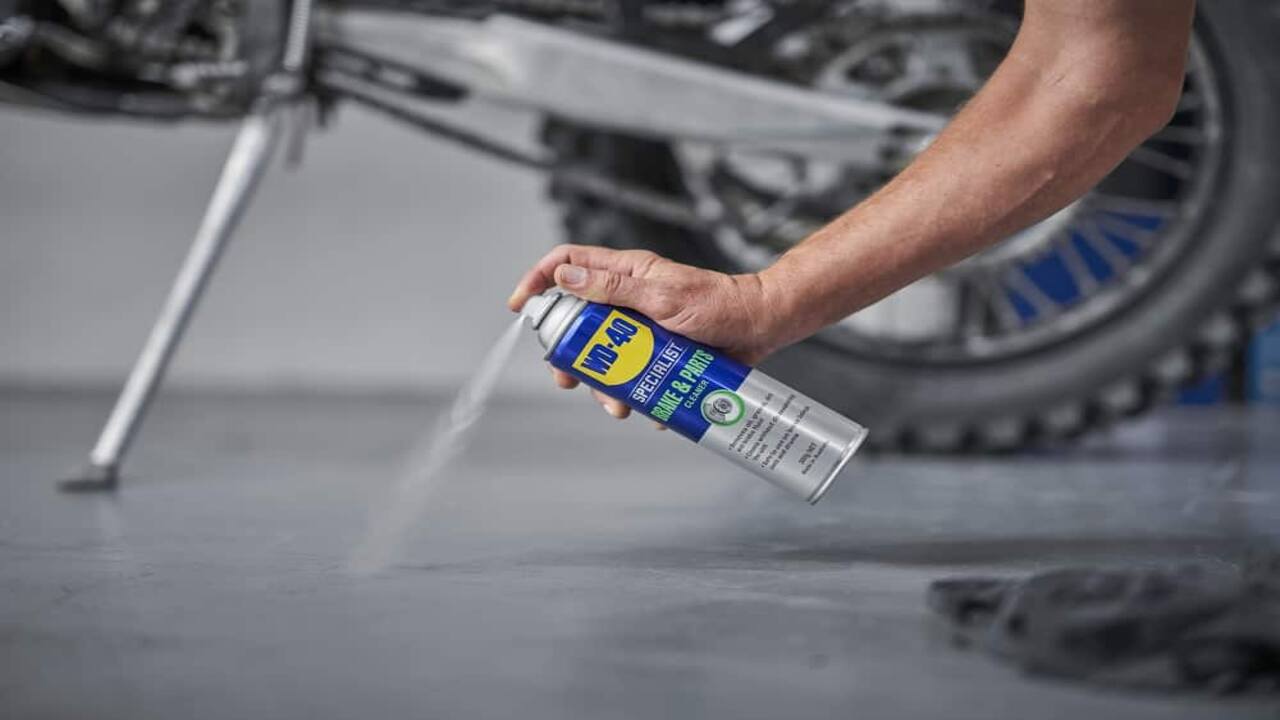
Choosing the right brake spray is essential in maintaining your braking system’s optimal performance. When selecting a brake spray, it’s necessary to consider your braking system’s specific needs. Silicone-based sprays are perfect for most vehicles, as they reduce noise and offer excellent protection from corrosion.
On the other hand, ceramic-infused sprays are ideal for performance brakes, as they can withstand high temperatures and provide superior stopping power. If you’re dealing with high-frequency vibrations, copper-based sprays can help address the issue.
To ensure that you make the right choice, it’s best to consult with professionals or check the manufacturer’s recommendations before purchasing a brake spray. Investing in the right brake spray can prolong the life of your braking system and keep you safe on the road.
How To Remove Brake Fluid Spray From Brakes
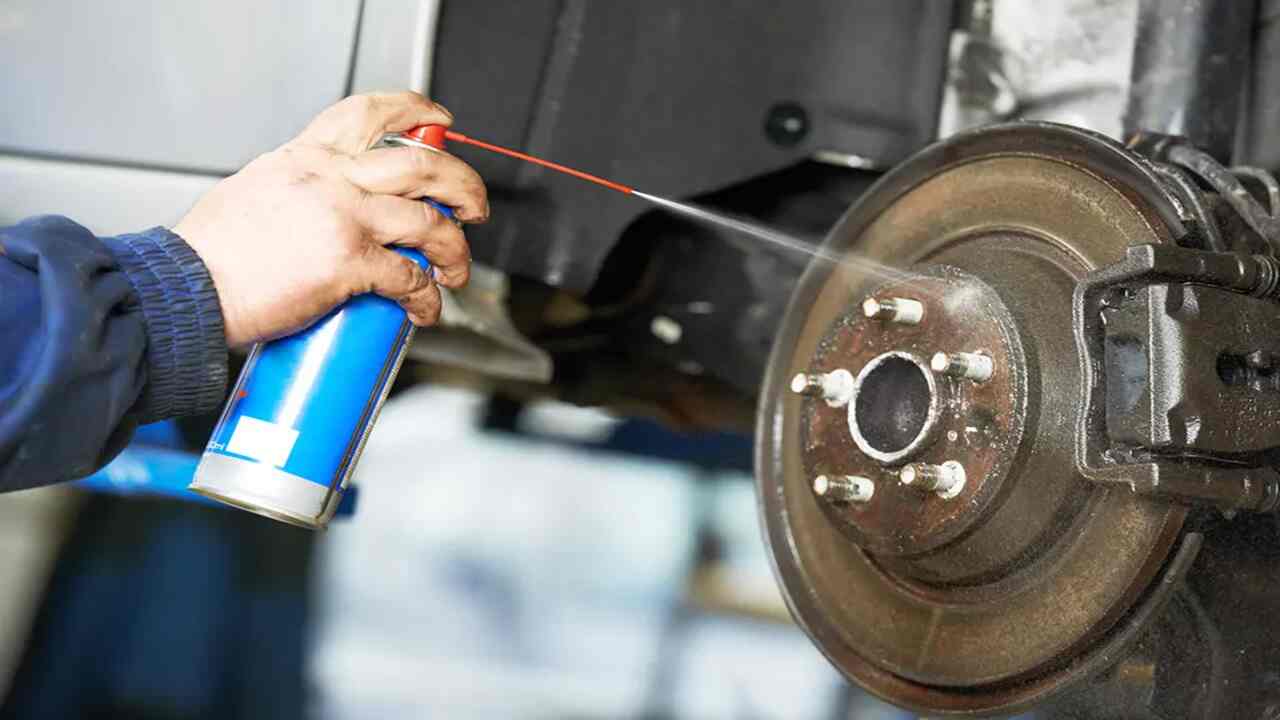
If you find brake fluid spray on your brakes, it’s essential to remove it as soon as possible to ensure the safety and functionality of your vehicle. Here are some steps to help you remove brake fluid spray from your brakes:
- Start by wearing protective gloves and eyewear to protect yourself from any potential harm.
- Use a clean cloth or paper towel to remove excess brake fluid from the affected area. Be careful not to spread the liquid further or contaminate other parts of your vehicle.
- Next, apply a brake cleaner specifically designed for removing brake fluid. Spray the cleaner onto a clean cloth and gently wipe the affected area, ensuring you cover all surfaces thoroughly.
- Allow the cleaner to sit briefly to break down the brake fluid residue.
- Afterward, use a clean cloth or paper towel to remove the cleaner and any remaining residue. If necessary, repeat this process until you remove all traces of brake fluid.
- Finally, inspect your brakes for any signs of damage or wear. If you notice any issues, it may be necessary to seek professional assistance.
Remember, proper maintenance of your vehicle’s brakes is crucial for safe driving. Suppose you’re unsure how to remove brake fluid spray or suspect underlying issues with your brakes. In that case, it’s always best to consult a qualified mechanic or automotive professional for guidance.
Conclusion
Regular brake maintenance is crucial for ensuring the safety and performance of your vehicle. Squeaking brakes can be annoying and indicate potential issues that must be addressed. Using a spray for squeaking brakes can help reduce the noise and improve the overall function of your brake system.
However, it’s essential to consider the pros and cons of using brake spray and choose the right type for your specific needs. Additionally, regular maintenance and cleaning of your brakes are essential in preventing squeaking and extending the lifespan of your brake components. Take the necessary steps to keep your brakes in top condition and ensure a smooth and safe driving experience.
Frequently Asked Questions
1.Is It Safe To Drive Bick With Squeaking Brakes?
Ans: It is not safe to drive a bike with squeaking brakes. Squeaking brakes may indicate a problem with the brake system. Promptly addressing brake issues is crucial for driving safety. Consider using a spray lubricant designed for brakes to help reduce or eliminate squeaking.
2.What Can I Spray On The Brakes To Stop Squealing?
Ans: To stop squealing brakes, spray a silicone-based brake lube on the back of the brake pads and other contact points. However, avoid pouring any lubricant on the rotor or brake calliper. If the squealing persists, it’s advisable to have a professional inspect your braking system.
3.What Is The Best Product To Stop Brakes From Squeaking?
Ans: There are various options to stop brakes from squeaking, including brake silencer sprays, lubricants, and anti-squeal shims. For effective results, it is recommended to use a high-quality brake silencer spray from trusted brands like CRC, Permatex, or Wurth.
4.Can Brake Cleaner Make Your Brakes Stop Squeaking?
Ans: Using brake cleaner can help eliminate dirt, dust, and grime from your brakes, potentially alleviating squeaking caused by buildup on the brake pads or rotors. However, if the noise is due to worn-out components or mechanical issues, brake cleaners will not fix the problem.
5.Can I Spray WD40 On My Brakes To Stop Squeaking?
Ans: No, using WD40 on brakes to stop squeaking is not recommended. WD40 is a lubricant and can reduce the braking power. Using a brake cleaner specifically designed for cleaning brake components is better. Regular maintenance and inspection of brake components can help prevent squeaking.
Meet Allen Yu, the Spray Guru behind Spray Guider. With a passion for transforming rides into rolling works of art, Allen Yu specializes in Bike and Car Sprays. Unleash your vehicle’s potential with expert tips and creative inspiration. Elevate your ride with Allen Yu—because every spray tells a story!
